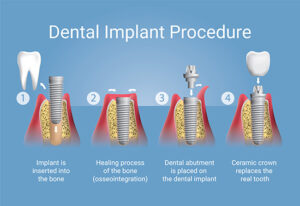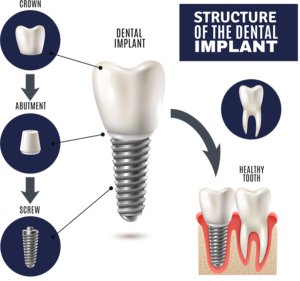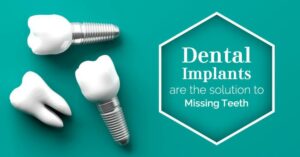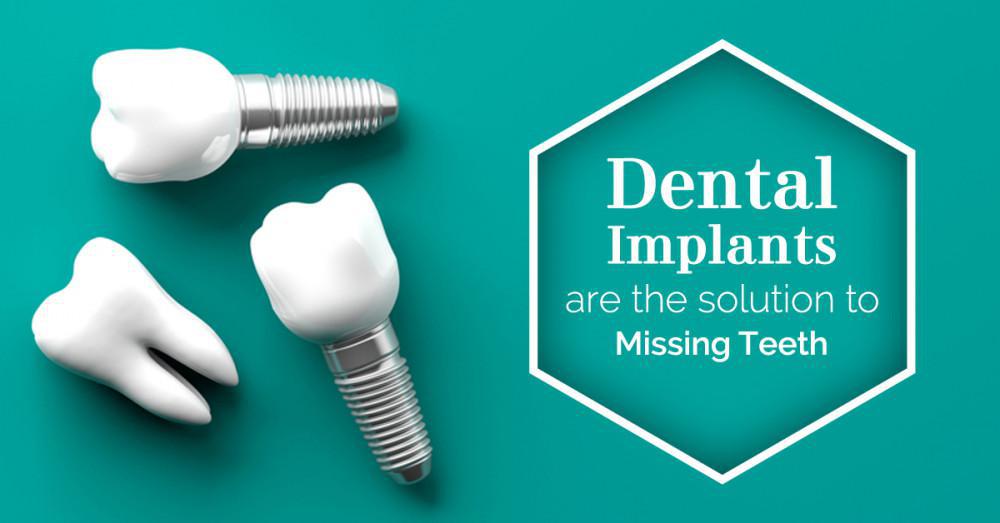
Dental Implant
Dental implant are a popular solution for those seeking to restore the appearance and functionality of their smile. With advancements in technology, this cosmetic dentistry procedure has become more accessible and offers a wide range of benefits. Whether you have lost a tooth due to injury, decay or aging, dental implants can help you regain your confidence and enhance your overall oral health. In this article, we will explore the ins and outs of dental implant procedures, including their benefits, the process involved and what to expect. So, if you’re considering dental implants, read on to learn more about this innovative solution.
Table of Contents
What is a dental implant?
Dental implants serve as artificial roots designed to replace missing teeth. Constructed from biocompatible titanium, dental implants ensure compatibility without triggering allergic reactions.
These implants are available in various forms and sizes, customized to suit individual needs and conditions. This versatility guarantees optimal integration, enhancing resilience and longevity.
Upon placement and a designated healing period, the implant becomes fully integrated within the bone, becoming an integral component of the jaw structure.
Dental implants not only restore the capacity for normal chewing but also offer impeccable aesthetic results.
Following implantation, a crown, bridge, or fixed/removable prosthesis is added to replicate natural teeth’s sensations and functions, achieving seamless functionality and aesthetics.
Why get a dental implant?
Why Choose Dental Implants
Dental implant placement is a comprehensive and transformative solution that transcends mere aesthetics. It’s an investment in restoring your smile’s aesthetics and functional integrity. Whether due to decay, damage, or other reasons, patients who have undergone tooth extraction can greatly benefit from the advantages of dental implants.
Restoring Dental Functionality
Beyond its aesthetic appeal, dental implants play a pivotal role in restoring essential dental functionality. These implants go beyond filling the gap left by a missing tooth; they contribute to the harmony and balance of your entire dental arch. By recreating the natural structure, dental implants facilitate proper chewing and speech, preventing neighboring teeth from shifting to compensate for the gap. This not only avoids potential misalignment issues but also contributes to the long-term health of your smile.
Personalized Comfort: Sedation Options
Understanding that each patient’s needs and comfort levels are unique, we offer a range of options for a pain-free experience. For those who may be sensitive to pain or dental anxiety, we provide the choice of undergoing the procedure under sedation. Our priority is your comfort and confidence throughout the process, ensuring you feel at ease as you take steps towards your dental transformation.
Trusting in Expertise
Our skilled professionals prioritize your comfort at every stage of the procedure. With the utilization of local anesthesia and sedation options, we ensure your experience is painless and stress-free. Rest assured, our team’s expertise guides you through a seamless journey to regaining a confident and fully functional smile. Choose dental implants with the assurance that you’re investing in both the aesthetics and the long-term health of your oral well-being.
When to get a dental implant?
Embarking on the journey to dental excellence often begins with the question of timing. Knowing when to consider a dental implant can significantly impact the success of the procedure and the long-term health of your smile. Factors such as tooth extraction, existing oral conditions, and personal preferences play a pivotal role in this decision-making process. In this section, we’ll guide you through the crucial aspects that influence the timing of dental implant placement, ensuring you make an informed and confident choice for your oral well-being.
Setting the Foundation for Successful Dental Implant Placement
Prior to any dental procedure, understanding the unique aspects of your oral health is paramount. Our commitment to precision begins with an initial assessment and comprehensive evaluation. Through detailed medical examination and advanced imaging techniques such as panoramic X-rays or jaw scans, our experienced dentist gains an in-depth understanding of your dental structure. This process allows us to assess the feasibility of dental implant placement accurately. By delving into your oral health history and addressing any existing concerns, we lay a solid foundation for your dental transformation. Trust in our expertise as we meticulously pave the way for a successful dental implant journey.
Initial Assessment and Comprehensive Evaluation
After a thorough medical assessment and the acquisition of a panoramic X-ray or jaw scan, our experienced dentist meticulously evaluates the suitability of dental implant placement. This process ensures a comprehensive understanding of your dental structure and any potential factors that might influence the procedure’s success.
Prioritizing Optimal Oral Health
Before proceeding with dental implant placement, we prioritize cultivating a healthy oral environment. This involves any necessary oral care, which includes addressing issues with your teeth and gums. By rectifying these concerns beforehand, we lay the groundwork for a smooth implantation process.
A Path to Impeccable Dental Hygiene
We believe in the significance of impeccable dental hygiene as the cornerstone of successful dental implant placement. To maximize the chances of long-term success, it’s imperative that the oral environment is free from any pathology. This ensures that your dental implants have a solid foundation, minimizing the risk of infection and potential implant failure.
Our Commitment to Your Smile’s Success
Throughout this meticulous preparatory phase, our commitment remains steadfast: to provide you with the optimal conditions for successful dental implant placement. Our dedication to your oral health and the longevity of your dental implants is reflected in every step we take. Trust in our expertise to ensure that your journey to a renewed smile is marked by excellence and longevity.
Can implants replace several teeth ?
Yes. They can respond to partial or total (entire upper or lower jaw).
When it comes to replacing missing teeth, dental implants offer versatile options that cater to both partial and complete tooth loss scenarios. Implant placement doesn’t always necessitate one implant per missing tooth. For instance, even two implants can provide stability to a removable denture. Your practitioner will present you with a range of treatment choices to align with your motivations and budget.
Benefits of Dental Implants
Biocompatible Marvels: Dental implants are crafted from biocompatible materials that seamlessly integrate with your natural oral environment.
Preserve Your Smile’s Integrity: Dental implants allow you to restore your smile without impacting your existing natural teeth.
Long-Lasting Warranty: Some implant brands, such as Straumann or Nobel, offer lifetime warranties, showcasing the durability and reliability of these solutions.
A Natural Feel and Functionality: Dental implants function just like natural teeth, ensuring comfortable chewing and a confident smile.
Approved and Effective: Dental implants are a well-established and approved solution, supported by a wealth of successful cases.
Counteracting Age’s Effects: Dental implants contribute to maintaining a youthful appearance by preventing the loss of bone and the subsequent sagging of facial features.
Preserve Bone Health: One of the significant advantages of dental implants is the preservation of bone density. When teeth are missing, bone loss can occur, leading to gum recession and facial changes. Implants counteract this process.
Protect Your Natural Teeth: Unlike dental bridges that might require adjacent teeth to be ground down, dental implants allow you to keep your healthy teeth intact.
Cutting-Edge Prosthetics: Modern prosthetic and implant solutions ensure exceptional longevity, stability, comfort, and functionality compared to traditional options.
Match Natural Teeth Strength: The stability and retention of prosthetic solutions and dental replacements on implants mirror the strength, reliability, and longevity of natural teeth.
By choosing dental implants, you’re investing in a holistic solution that not only restores your smile’s aesthetics but also bolsters your oral health and overall quality of life.
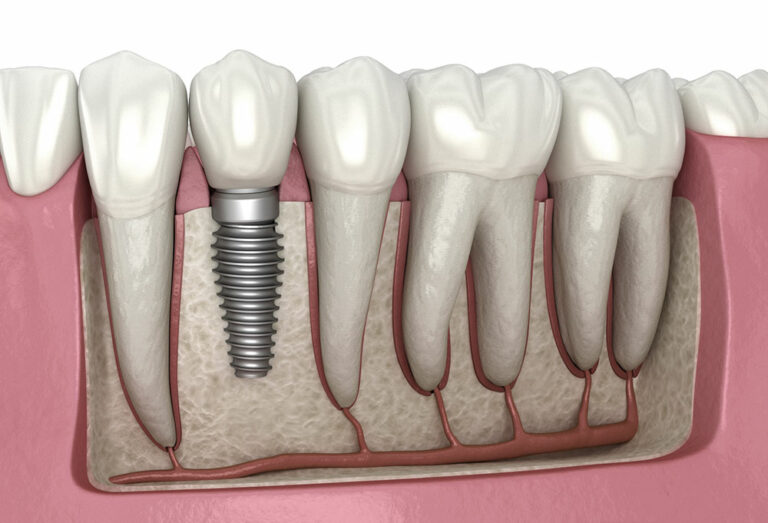

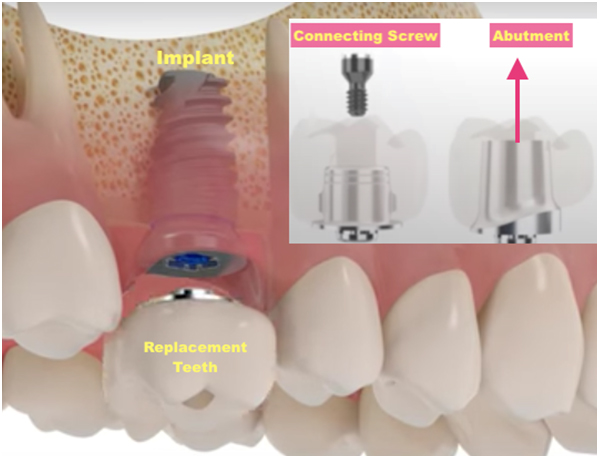
What are the requirements to have an implant?
Upon successful implant placement, the subsequent step involves the integration of a crown, bridge, or fixed/removable prosthesis. This phase ensures that your dental implant provides the same sensations and functionality as your natural teeth.
Tailored Solutions for Every Need:
Protecting Adjacent Teeth: Dental implants offer an alternative to traditional bridges that may require adjacent teeth to be altered. With implants, you can replace missing teeth without affecting neighboring ones.
Aesthetic Precision and Security: If you’re seeking an aesthetic, precise, and safe solution for missing teeth, dental implants provide an optimal choice. This holds particularly true for cases of complete edentulism, where options like “all on 4” or “all on 6” implants can be transformative.
Favorable Bone Conditions: Dental implant success is closely tied to bone health. If you possess sufficient bone mass with a healthy texture, you’re in a favorable position for implant placement. Factors like the cessation of jaw growth and the presence of robust bone are key determinants in successful implantation. In cases where bone quantity is inadequate, bone augmentation techniques may be considered.
No Age Limit: Dental implant candidacy isn’t restricted by age. Regardless of your stage in life, as long as your oral health and bone conditions are suitable, dental implants can be a viable solution.
By choosing dental implants, you’re opting for a versatile and personalized solution that caters to your unique needs. Whether it’s about preserving adjacent teeth, achieving aesthetics, addressing edentulism, or ensuring optimal bone conditions, dental implants offer a comprehensive and lasting answer to your oral health concerns.
What are the different stages of dental implant process?
1. Preliminary Assessment:
Before commencing any dental implant journey, a thorough preliminary study is conducted. The dental surgeon analyzes the patient’s medical history and performs a comprehensive oral examination. Addressing any existing dental issues, such as cavities, is crucial before proceeding with the implant procedure. Furthermore, a panoramic dental X-ray or a jaw scan is carried out to assess the bone mass’s sufficiency for accommodating the impending implant(s).
2. Addressing Dental Concerns:
Should any dental diseases be present, a personalized treatment plan is devised to eliminate obstacles for implant placement. The dentist ensures that any existing dental issues are resolved, and bone filling is undertaken if necessary.
3. Implant Placement:
The placement of dental implants is a surgical procedure conducted under local anesthesia. The dentist initiates the process by making an incision in the mucosa to access the jawbone. The targeted cavities are created to accommodate the implant(s), which are then securely screwed into place. The procedure is completed with stitches that will be absorbed over the following weeks. While the procedure is relatively straightforward, minor discomfort such as swelling and slight pain can be expected.
4. Healing and Integration:
Post-implant placement, a crucial healing period unfolds over the course of three to six months. During this time, the bone seamlessly integrates with the implant, ensuring stability akin to a natural tooth. A temporary crown may be provided to maintain the aesthetic aspect. Rest and meticulous oral care are paramount during this phase to avoid complications and ensure proper integration.
5. Impression Taking:
Upon full integration, the implant’s position is stable, and the surgeon takes impressions of the jaw. These impressions aid in the crafting of the crown, bridge, or complete prosthesis. A gingival screw may be introduced to accommodate the crown, ensuring a seamless fit.
Post-Procedure Care:
- Adopt a soft food diet initially and avoid hot and hard foods to minimize stress.
- Abstain from alcohol and tobacco consumption to promote healing.
- Prevent bleeding by avoiding strenuous activities and high-blood-pressure-inducing foods.
- Maintain impeccable oral hygiene through gentle brushing and mouthwash rinsing.
- In case of bleeding, apply gentle pressure with a compress; consult the dentist if needed.
Ensuring Longevity:
To enjoy the lasting benefits of dental implants, regular check-ups are crucial. At least two annual visits are recommended for necessary assessments and maintenance treatments, including professional cleaning. While the dental surgeon initiates the implant process, the patient’s commitment to maintenance is key to long-term success.
With each step meticulously orchestrated, the dental implant journey ensures both the immediate transformation of your smile and its sustained health over time.
There are a few more precautions to follow after the dental implants operation:
1. Dietary Considerations:
- During the initial hours and days post-surgery, opt for soft foods, ideally served warm or cold.
- Steer clear of hot foods and avoid hard substances that can exert undue pressure on the implants.
2. Infection Prevention:
- Vitality is preserved by minimizing products that could hinder healing or foster infection. Restrict or eliminate alcohol and tobacco consumption.
3. Ensuring Minimal Bleeding:
- Prevent bleeding issues by refraining from intense physical exertion. Allow your body to recover without strain.
- Watch for factors that can lead to a rise in blood pressure, such as consuming alcohol, coffee, and certain foods.
- Avoid behaviors like using straws, excessive spitting, and overly aggressive teeth rinsing to prevent potential bleeding.
4. Mindful Food Choices:
- Certain foods, like dairy products and beer, have the potential to encourage bacterial growth. Opt for boiled foods to minimize such risks.
5. Gentle Oral Hygiene:
- Maintain impeccable oral hygiene with gentle brushing and mouthwash rinsing.
6. Addressing Bleeding:
- If bleeding occurs, apply gentle pressure with a compress for 15 minutes. Should bleeding persist beyond this time, seek immediate guidance from your dental surgeon.
Maximizing Implant Longevity:
- Dental implants offer an approved technique that guarantees a superb aesthetic outcome and the enduring resilience of prostheses.
- To fully harness these benefits, adopting a few measures is essential. Regularly monitor your teeth’s condition and track the implant’s progression while undertaking any prescribed maintenance treatments.
Recommended Follow-Ups:
- Commit to at least two annual visits to maintain the health and longevity of your dental implants.
- These appointments serve as a platform for essential checks and also facilitate maintenance care. Consider an annual comprehensive teeth scaling for optimal oral health.
Shared Responsibility for Success:
- The dental surgeon’s role in successful implant placement is pivotal, ensuring a seamless intervention.
- Post-implantation, you shoulder the responsibility for your dental implant’s ongoing well-being. Regular assessments and diligent care are key.
With a structured approach to post-procedure care, you not only safeguard your investment in dental implants but also pave the way for an enduring smile that stands the test of time.
